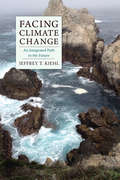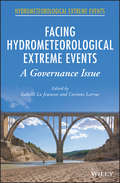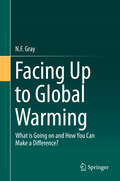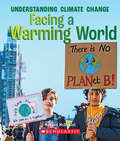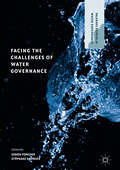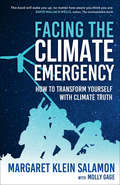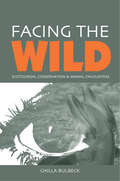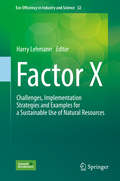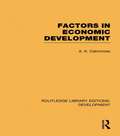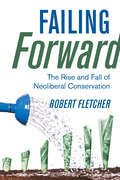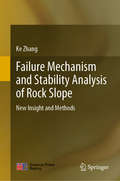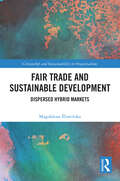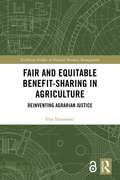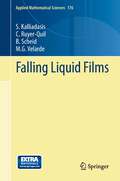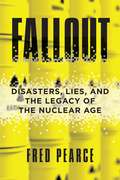- Table View
- List View
Facing Climate Change: An Integrated Path to the Future
by Jeffrey T. KiehlJeffrey T. Kiehl is a senior scientist at the National Center for Atmospheric Research and a fellow of the American Geophysical Union and the American Meteorological Society. He is a recipient of the AGU Climate Communication Prize. He is also a senior Jungian analyst with the C. G. Jung Institute of Colorado, the Inter-Regional Society of Jungian Analysts, and the International Association for Analytical Psychology.
Facing Climate Change: An Integrated Path to the Future
by Jeffrey T. KiehlFacing Climate Change explains why people refuse to accept evidence of a warming planet and shows how to move past partisanship to reach a consensus for action. A climate scientist and licensed psychotherapist, Jeffrey T. Kiehl examines the psychological phenomena that twist our relationship to the natural world and their role in shaping the cultural beliefs that distance us further from nature. He also accounts for the emotions triggered by the lived experience of climate change and the feelings of fear and loss they inspire, encouraging us to retreat into fantasy.But all is not lost. By evaluating our way of being, Kiehl unleashes a potential human emotional understanding that can reform our behavior and help protect the Earth. Kiehl dives deep into the human brain's psychological structures and human spirituality's imaginative power, mining promising resources for creating a healthier connection to the environment-and each other. Facing Climate Change is as concerned with repairing our social and political fractures as it is with reestablishing our ties to the world, teaching us to push past partisanship and unite around the shared attributes that are key to our survival. Kiehl encourages policymakers and activists to appeal to our vast interdependence as a global society, extracting politics from the process and making decisions about our climate future that are more substantial and sustaining.
Facing Gaia Eight Lectures on the New Climatic Regime
by Bruno LatourThe emergence of modern sciences in the seventeenth century profoundly renewed our understanding of nature. For the last three centuries new ideas of nature have been continually developed by theology, politics, economics, and science, especially the sciences of the material world.
Facing Hydrometeorological Extreme Events: A Governance Issue (Hydrometeorological Extreme Events)
by Corinne Larrue Isabelle La JeunesseProvides an understanding of the relationship between social-ecological systems and multilevel governance so that readers can properly deal with hydrometeorological extreme events and hazards Based on field investigations from EU research projects, this book is the first to devote itself to scientific and policy-related knowledge concerning climate change-induced extreme events. It depicts national and international strategies, as well as tools used to improve multilevel governance for the management of hydrometeorological risks. It also demonstrates how these strategies play out over different scales of the decision-making processes. Facing Hydrometeorological Extreme Events: A Governance Issue offers comprehensive coverage of such events as floods, droughts, coastal storms, and wind storms. It showcases real-life success stories of multilevel governance and highlights the individuals involved and the resources mobilized in the decision-making processes. The book starts by presenting a synthesis of hydrometeorological extreme events and their impacts on society. It then demonstrates how societies are organizing themselves to face these extreme events, focusing on the strategies of integration of risk management in governance and public policy. In addition, it includes the results of several EU-funded projects such as CLIMB, STARFLOOD, and INTERREG IVB project DROP. The first book dedicated to hydrometeorological extreme events governance based on field investigations from EU research projects Offers a “multi-hazards” approach—mixing policy, governance, and field investigations’ main outputs Features the results of EU-funded projects addressing hydrometeorological extreme events Part of the Hydrometeorological Extreme Events series Facing Hydrometeorological Extreme Events is an ideal book for upper-graduate students, postgraduates, researchers, scientists, and policy-makers working in the field.
Facing Up to Global Warming
by N. F. GrayIn this volume, Professor N. F. Gray offers a comprehensive primer on climate change, sustainability, and how the two concepts are related. This book consists of fifteen chapters, each treating a specific aspect of the current global crisis, including scientific background as well as an up to date appraisal of the issue at hand. It covers the reasons behind climate change and the effect it will have on the planet and on the reader directly. Gray also presents readers with the means to assess their own environmental impact and details positive individual and community actions to address global warming. "Climate change," "global warming," and "sustainability" are phrases that almost everyone has heard, whether on the news or around the dinner table. The increasing frequency of major events such as droughts, severe storms, and floods are beginning to make these concepts inescapable, and being fully informed is an absolute necessity for students and indeed for us all. Nick Gray (PhD, ScD) is a founding member of the Environmental Sciences Unit (1979) at Trinity College Dublin, which was the first center for postgraduate research and training in environmental science and technology in Ireland. He has written a number of books and over 150 research papers and book chapters, and currently serves as the Director of the Trinity Centre for the Environment.
Facing a Warming World (A True Book (Relaunch))
by Melissa McDanielHow did scientists come to understand that climate change is happening? And how is it affecting human societies today? This book explores the human response to climate change over the past century. Chapters address the health effects and emotional impact of climate change, as well as how people are working to solve the problem, from protests to political and technological change.Glaciers are melting. Summers are heating up. Sea levels are on the rise. Climate change is affecting every corner of our planet - and it's the subject of a lot of concern, activism, and debate. STEM meets current events in this new A True Book set that offers readers the chance to learn about the causes and effects of climate change, as well as how people around the world are reacting to it. Students will read about the history and scope of the problem, analyze the same kinds of evidence that scientists do, and come away with tools that will help them respond to this pressing global issue.This series covers Next Generation Science Standards core ideas including Weather and Climate, Human Impacts on Earth Systems, Conservation of Energy and Energy Transfer, and Biodiversity and Humans.
Facing the Challenges of Water Governance (Palgrave Studies in Water Governance: Policy and Practice)
by Stéphane Saussier Simon PorcherAccess to water is one of the most pressing global issues of the twenty-first century, particularly when set against the background of a rapidly growing global population. This book provides a cutting-edge, comprehensive overview of the challenges facing water governance and regulatory choices. The recently adopted Sustainable Development Goals set forward an ambitious agenda of providing universal access to good quality water supply and sanitation services within a financially constrained environment: however, the various peculiarities of each country regarding water governance makes it difficult to identify and implement the best practices and benchmarks. Drawing together empirical studies from countries around the world, the editors and contributors combine extensive data to review the individual challenges facing each country, from the supervision of autonomous regulatory bodies to the question of centralization and the influence of local utility companies. This pioneering and practical volume will be of interest and value not only to students and scholars of water governance, but also to practitioners and regulators.
Facing the Change
by Steven Pavlos Holmes"Amidst the current deluge of statistics about global warming, this book provides a refreshing look at how individuals are affected. This is a beautiful book to keep near, open at random, and share the words of gifted writers as they prepare for the coming changes."-Publishers Weekly"Holmes, a scholar in environmental humanities, has assembled a rich, varied collection of personal accounts and poems...An artistic and intimate approach to the problem that humanizes our concerns."--Booklist"How do you respond when the familiar, benevolent, and predictable world you count on becomes strange, hostile, and chaotic? First, you must face it. Next, bear witness. Steven Holmes has gathered compelling testimonies about the ways our earthly home is changing in the short space of our own lifetimes. They beg us to pay attention and act. We are wise to heed these passionate voices."-Chip Ward, author of Hope's Horizon"These earnest and heartfelt poems, essays, and imaginings change our discourse from data to personal testimony, channeling 'care and concern.' Maybe, just maybe, these authors who call us to 'unheroic' action 'on life's behalf' will steer us away from tragedy and chaos. 'Emerging from denial is like moving from blindness to light.' As the refrain from one writer puts it, 'Good Lord! Good luck!'"-Stephen Trimble, author of Bargaining for Eden: The Fight for the Last Open Spaces in America"Facing the Change shares the stories of some of the many people in the US and the world who are already witnessing climate change here and now. They are giving us early warning signs; it's up to all of us to act now."-Mae Boeve, executive director of 350.org"Facing the Change registers the impact of climate destabilization, not only on the sky above us and the earth beneath our feet, but also within our hearts. The voices in this eloquent and original book convey the dread and grief, the anger, but also the experiences of love and community that are intensified by the defining ecological challenge of our time."-John Elder, author of Reading the Mountains of Home, editor of The Norton Book of Nature"These eloquent stories, essays, and poems by scores of 'emotional and cultural first responders' to the effects of climate change are sure to deliver a powerful wake-up call to anyone who has supposed that nothing an individual person can say or do will affect this impending disaster."-Lawrence Buell, author of The Environmental Imagination"...the contributors to Facing the Change have begun to reveal the experiential heart of a planetary process. This is a truly important project." -Scott Slovic, editor of ISLE: Interdisciplinary Studies in Literature and EnvironmentFilled not with bare facts and dire warnings but with evocative, accessible stories, essays, and poetry, Facing the Change shows how global warming is affecting the everyday lives of people today. A wide range of writers brings courage, honesty, and insight to one of the major issues of our lives.Steven Pavlos Holmes, Ph.D., is an independent scholar in the environmental humanities, with a special interest in people's personal experiences of the natural world. His first book, The Young John Muir: An Environmental Biography, won the Modern Language Association's Prize for Independent Scholars. He lives in Jamaica Plain, Massachusetts.
Facing the Climate Emergency: How to Transform Yourself with Climate Truth
by Molly Gage Margaret Klein SalamonStop fretting and start fighting global warming: “A remarkable account of how you can become a climate warrior.” —Bill McKibben, founder of 350.orgYes, we’re facing catastrophic breakdown of our climate. Yes, it’s terrifying. But you don’t have to be paralyzed. You can use your pain to transform yourself, your friends, and the world. You can become the hero humanity needs. This book will show you how.Facing the Climate Emergency is an action-oriented self-help guide showing you how to maximize your potential to meet the greatest challenge humanity has ever faced. Written for all of us struggling to cope and wanting to do something to stop the climate crisis, it gives us the blueprint to leave “normal” behind and enter climate “emergency mode.”How to face the climate crisis and accept your fears, anger, grief, guilt, and other emotionsTurning negative feelings into tangible action to respond to the crisisRising to heroism and maximizing your impact by joining the Climate Emergency MovementInformation on further reading, questions for self-reflection, and exercises “This book will wake you up, no matter how aware you think you are.” —David Wallace-Wells, #1 New York Times-bestselling author of The Uninhabitable Earth
Facing the Wave: A Journey in the Wake of the Tsunami
by Gretel EhrlichA passionate student of Japanese poetry, theater, and art for much of her life, Gretel Ehrlich felt compelled to return to the earthquake-and-tsunami-devastated Tohoku coast to bear witness, listen to survivors, and experience their terror and exhilaration in villages and towns where all shelter and hope seemed lost. In an eloquent narrative that blends strong reportage, poetic observation, and deeply felt reflection, she takes us into the upside-down world of northeastern Japan, where nothing is certain and where the boundaries between living and dying have been erased by water. The stories of rice farmers, monks, and wanderers; of fishermen who drove their boats up the steep wall of the wave; and of an eighty-four-year-old geisha who survived the tsunami to hand down a song that only she still remembered are both harrowing and inspirational. Facing death, facing life, and coming to terms with impermanence are equally compelling in a landscape of surreal desolation, as the ghostly specter of Fukushima Daiichi, the nuclear power complex, spews radiation into the ocean and air. Facing the Wave is a testament to the buoyancy, spirit, humor, and strong-mindedness of those who must find their way in a suddenly shattered world.
Facing the Wild: Ecotourism, Conservation and Animal Encounters
by Chilla BulbeckWhat do wild animals mean to humans? Will they survive both rampant habitat loss and extinction caused by human encroachment and, as ecotourists, our enthusiasm for them? With ecotourism now the fastest growing segment of tourism, and encounters with wild animals - be it swimming with dolphins, going on safari or bird watching - ever more popular, these are critical questions. Yet until now little has been known about why people crave encounters with wild animals and the meaning for the ecotourism industry, conservation efforts and society at large. Facing the Wild is the first serious empirical examination of why people seek out animals in their natural environment, what the desire for this experience tells us about the meanings of animals, nature, authenticity and wilderness in contemporary industrialized societies, and whether visitors change their environmental perspectives and behaviour, as the custodians of wildlife parks would like them to. The book explores the contradictions and ambivalence that so many people experience in the presence of 'wild nature' - in loving it we may diminish it and in the act of wanting to see it we may destroy it. Ultimately the book makes a case for 'respectful stewardship' of a 'hybrid nature' and provides insight for both practitioners and ecotourists alike.
Factor X
by Harry LehmannFactor X: Re-source Designing the Recycling Society explores the role of recycling in efforts to achieve the sustainable world envisioned in the Federal Environment Ministry s Resource Efficiency Programme, known as ProgRess. The chapters build a roadmap to a Recycling Society in which the decoupling of resource consumption and economic growth is accomplished. "
Factors in Economic Development (Routledge Library Editions: Development)
by A. K. CairncrossFirst published in 1961, this work is a compendium of essays written by esteemed economist Sir Alexander Cairncross, pertaining to the theme of economic development. A wide cross-section of factors are taken into account in this extensive collection of articles, amongst which are the importance of investment and technical progress; trade; administration and planning; and the role of education.
Failing Forward: The Rise and Fall of Neoliberal Conservation
by Robert FletcherFailing Forward documents the global rise of neoliberal conservation as a response to biodiversity loss and unpacks how this approach has managed to "fail forward" over time despite its ineffectiveness. At its core, neoliberal conservation promotes market-based instruments intended to reconcile environmental preservation and economic development by harnessing preservation itself as the source of both conservation finance and capital accumulation more generally. Robert Fletcher describes how this project has developed over the past several decades along with the expanding network of organizations and actors that have come together around its promotion. Drawing on Lacanian psychoanalysis, he explores why this strategy continues to captivate states, nongovernmental organizations, international financial institutions, and the private sector alike despite its significant deficiencies. Ultimately, Fletcher contends, neoliberal conservation should be understood as a failed attempt to render global capitalism sustainable in the face of its intensifying social and ecological contradictions. Consequently, the only viable alternative capable of simultaneously achieving both environmental sustainability and social equity is a concerted program of "degrowth" grounded in post-capitalist principles.
Failure Mechanism and Stability Analysis of Rock Slope: New Insight and Methods
by Ke ZhangThis book presents in-depth coverage of laboratory experiments, theories, modeling techniques, and practices for the analysis and design of rock slopes in complex geological settings. It addresses new concepts in connection with the kinematical element method, discontinuity kinematical element method, integrated karst cave stochastic model-limit equilibrium method, improved strength reduction method, and fracture mechanics method, taking into account the relevant geological features. The book is chiefly intended as a reference guide for geotechnical engineering and engineering geology professionals, and as a textbook for related graduate courses.
Fair Trade Organizations and Social Enterprise: Social Innovation through Hybrid Organization Models (Routledge Studies in Management, Organizations and Society)
by Benjamin HuybrechtsFor several decades, social enterprises have been pioneers in the conception and implementation of a pathbreaking social innovation: Fair Trade (FT). Fair Trade Social Enterprises have created a movement which has challenged mainstream trading practices and offered development opportunities for disadvantaged producer groups in the South. Starting from a niche market aimed at convinced customers, FT has expanded and entered mainstream retailing outlets, growing in visibility and market share, while simultaneously experiencing diversification of its organization models. While pioneer Fair Trade Social Enterprises in the early years were largely nonprofit organizations relying on voluntary work, they have become increasingly diversified in terms of legal forms, governance models and organizational practices. These diversified models seem to reflect the hybrid nature of FT itself, through different ways of combining a commercial activity (trading of FT products), a social mission (support to producers), and an explicit or implicit political message (often expressed through education and advocacy). Based on the study of Fair Trade Social Enterprises across Europe, this book builds a typology of organization models for FT. Author Benjamin Huybrechts further examines how the different organization models combine the economic, social, and political dimensions of FT, and how they manage the possible tensions between these dimensions. Fair Trade Organizations and Social Enterprise proposes a range of theoretical approaches to interpret the diversity of Fair Trade Social Enterprises and offers concrete avenues for managing social enterprises and hybrid organizations in general.
Fair Trade and Sustainable Development: Dispersed Hybrid Markets (Citizenship and Sustainability in Organizations)
by Magdalena ŚliwińskaFair Trade constitutes a social-business initiative that plays a crucial role in the transition towards a "sustainable market economy", countering the major challenges of the 21st century. This research monograph reveals the mechanisms behind this process. It argues that Fair Trade constitutes a new type of market, "a Dispersed Hybrid Market (DHM)", that due to its specific features contributes to a more pro-social functioning of the entire market and taking responsibility for sustainable development by different market participants. It demonstrates, thus, what was underestimated about Fair Trade, and which is extremely important, that it can have a positive impact on the market in terms of sustainable transformation. The book is intended for researchers, lecturers, students, practitioners, and political decision-makers interested in sustainable development, Fair Trade, and transition towards sustainable markets, business, and economy. It contributes to better understanding of sustainability challenges explaining specifics of Fair Trade market, revealing paradoxes and barriers of its development and showing mechanisms of its spillover effects. It also develops arguments about the need to change the role of the state in the face of global challenges and to support such grassroots international initiatives as Fair Trade. Therefore the practical recommendations address both the desired directions of development of the self-governance of this initiative and the expected role of the state towards it, in particular possible ways to strengthen it.
Fair Trade, Sustainability, and Social Change
by Mark Hudson Ian Hudson Mara FridellThe authors critically evaluate the fair trade movement's role in pursuing a more just and environmentally sustainable society. Using fair trade as a case study of the shift toward non-state forms of governance, they focus on its role not only as a regulatory tool, but as a catalyst for broader social and political transformation.
Fair Weather: Effective Partnership in Weather and Climate Services
by Committee on Partnerships in WeatherDecades of evolving U.S. policy have led to three sectors providing weather services--NOAA (primarily the National Weather Service [NWS]), academic institutions, and private companies. This three-sector system has produced a scope and diversity of weather services in the United States second to none. However, rapid scientific and technological change is changing the capabilities of the sectors and creating occasional friction. Fair Weather: Effective Partnerships in Weather and Climate Services examines the roles of the three sectors in providing weather and climate services, the barriers to interaction among the sectors, and the impact of scientific and technological advances on the weather enterprise. Readers from all three sectors will be interested in the analysis and recommendations provided in Fair Weather.
Fair and Equitable Benefit-Sharing in Agriculture: Reinventing Agrarian Justice (Earthscan Studies in Natural Resource Management)
by Elsa TsioumaniThis book explores the emergence and development of the legal concept of fair and equitable benefit-sharing, and its application in agriculture. Developed in the 1990s, the concept of fair and equitable benefit-sharing has been deployed in an ever-wider variety of international instruments, including those on biodiversity, climate change, and human rights. A lack of clarity persists however on what fair and equitable benefit-sharing requires and entails, and whether its implementation supports or eventually undermines equity and justice. This book examines these questions in the area of land, food and agriculture, addressing, for the first time, several instances of the agricultural production chain, including research and development, land governance and land use, and access to markets. It identifies challenges regarding implementation of the concept as enshrined in environmental treaties and soft-law instruments, with a focus on the International Treaty on Plant Genetic Resources for Food and Agriculture, the Voluntary Guidelines on Tenure and the UN Declaration on the Rights of Peasants. It investigates its role, enabling conditions and limitations, in a contradictory policy context involving environmental, food security and human rights objectives but also a growing web of multilateral and bilateral trade and investment agreements. Linking international law research with a socio-legal analysis, the book addresses four grassroots examples, which offer ideas for institutional and legal innovation from the local to the global level. This interdisciplinary title will be of great interest to students and scholars of international environmental law, agriculture, land law, development studies and international governance, as well as policymakers and practitioners working in these fields.
Fairness and Justice in Environmental Decision Making: Water Under the Bridge (Routledge Explorations in Environmental Studies)
by Catherine GrossBy crossing disciplinary boundaries, this book uniquely connects theories of justice with people's lived experience within social conflicts over resource sharing. It shows why some conflicts, such as local opposition to wind farms and water disputes, have become intractable social problems in many countries of the world. It shows the power of injustice in generating opposition to decisions. The book answers the question: why are the results of many government initiatives and policies not accepted by those affected? Focusing on two social conflicts over water sharing in Australia to show why fairness and justice are important in decision-making, the book shows how these conflicts are typical of water sharing and other natural resource conflicts experienced in many countries around the world, particularly in the context of climate change. It tells the stories of these conflicts from the perspectives of those involved. These practically-based findings are then related back to ideas and constructs of justice from disciplines such as social psychology, political philosophy and jurisprudence. With a strong practical focus, this book offers readers an opportunity to develop a deep understanding of fairness and justice in environmental decision-making. It opens up a wealth of fairness and justice ideas for decision-makers, practitioners, and researchers in natural resource management, environmental governance, community consultation, and sustainable development, as well as people in government and corporations who interface and consult with communities where natural resources are being used.
Fairness in International Climate Change Law and Policy
by Friedrich SoltauThis work analyses fairness and equity dimensions of the climate regime. A central issue in international law and policy is how countries of the world should allocate the burden of addressing global climate change. With the link between human activities and climate change clearly established, and the first impacts of climate change being felt, there is a renewed sense of urgency in addressing the problem. Based on an overview of science and the development of the climate regime to date, this book seeks to identify the elements of a working consensus on fairness principles that could be used to solve the hitherto intractable problem of assigning responsibility for combating climate change. The book demonstrates how an analysis of fairness dimensions of climate change - grounded in practical developments and illustrated with reference to the latest developments - can add value to our understanding of current developments and future options for international climate law and policy.
Falling Liquid Films
by C. Ruyer-Quil M. G. Velarde B. Scheid S. KalliadasisFalling Liquid Films gives a detailed review of state-of-the-art theoretical, analytical and numerical methodologies, for the analysis of dissipative wave dynamics and pattern formation on the surface of a film falling down a planar inclined substrate. This prototype is an open-flow hydrodynamic instability, that represents an excellent paradigm for the study of complexity in active nonlinear media with energy supply, dissipation and dispersion. It will also be of use for a more general understanding of specific events characterizing the transition to spatio-temporal chaos and weak/dissipative turbulence. Particular emphasis is given to low-dimensional approximations for such flows through a hierarchy of modeling approaches, including equations of the boundary-layer type, averaged formulations based on weighted residuals approaches and long-wave expansions. Whenever possible the link between theory and experiment is illustrated, and, as a further bridge between the two, the development of order-of-magnitude estimates and scaling arguments is used to facilitate the understanding of basic, underlying physics. This monograph will appeal to advanced graduate students in applied mathematics, science or engineering undertaking research on interfacial fluid mechanics or studying fluid mechanics as part of their program. It will also be of use to researchers working on both applied, fundamental theoretical and experimental aspects of thin film flows, as well as engineers and technologists dealing with processes involving isothermal or heated films. This monograph is largely self-contained and no background on interfacial fluid mechanics is assumed.
Falling in Love with Nature: The Values of Latinx Catholic Environmentalism (North American Religions)
by Amanda J. BaughExplores the contours of Latinx Catholic environmentalismHome-based conservationist measures such as cultivating backyard gardens, avoiding consumerism, and limiting waste are widespread among Spanish-speaking Catholics across the United States. Yet these home-based conservationist practices are seldom recognized as “environmental” because they are enacted by working-class immigrant communities and do not conform to the expectations of mainstream environmentalism.In Falling in Love with Nature, Amanda J. Baugh tells the story of American environmentalism through a focus on Spanish-speaking Catholics, shedding light on environmental actors who have been hidden in plain sight. While dominant narratives about environmental activism include minorities, primarily in the realm of environmental racism and injustice, Baugh demonstrates that minority communities are not merely victims of environmental problems. They can be active agents who express love for nature based on inherited family traditions and close relationships with the land. Baugh shows that Spanish-speaking Catholics have values that have been overlooked in global discourses, grassroots movements, and the highest echelons of the US Catholic Church. By drawing attention to the environmental knowledge that is already abundant within Spanish-speaking Catholic communities, Falling in Love with Nature challenges readers to rethink their assumptions about who can be an environmental leader and what counts as environmentalism.
Fallout: Disasters, Lies, and the Legacy of the Nuclear Age
by Fred PearceAn investigation into our complicated 7-decade-long relationship with nuclear technology, from the bomb to nuclear accidents to nuclear waste.From Hiroshima to Chernobyl, Fukushima to the growing legacy of lethal radioactive waste, humanity's struggle to conquer atomic energy is rife with secrecy, deceit, human error, blatant disregard for life, short-sighted politics, and fear. Fallout is an eye-opening odyssey through the first eight decades of this struggle and the radioactive landscapes it has left behind. We are, he finds, forever torn between technological hubris and all-too-human terror about what we have created.At first, Pearce reminds us, America loved the bomb. Las Vegas, only seventy miles from the Nevada site of some hundred atmospheric tests, crowned four Miss Atomic Bombs in 1950s. Later, communities downwind of these tests suffered high cancer rates. The fate of a group of Japanese fishermen, who suffered high radiation doses from the first hydrogen bomb test in Bikini atoll, was worse. The United States Atomic Energy Commission accused them of being Red spies and ignored requests from the doctors desperately trying to treat them.Pearce moves on to explore the closed cities of the Soviet Union, where plutonium was refined and nuclear bombs tested throughout the '50s and '60s, and where the full extent of environmental and human damage is only now coming to light. Exploring the radioactive badlands created by nuclear accidents--not only the well-known examples of Chernobyl and Fukushima, but also the little known area around Satlykovo in the Russian Ural Mountains and the Windscale fire in the UK--Pearce describes the compulsive secrecy, deviousness, and lack of accountability that have persisted even as the technology has morphed from military to civilian uses. Finally, Pearce turns to the toxic legacies of nuclear technology: the emerging dilemmas over handling its waste and decommissioning of the great radioactive structures of the nuclear age, and the fearful doublethink over the world's growing stockpiles of plutonium, the most lethal and ubiquitous product of nuclear technologies. For any reader who craves a clear-headed examination of the tangled relationship between a powerful technology and human politics, foibles, fears, and arrogance, Fallout is the definitive look at humanity's nuclear adventure.
